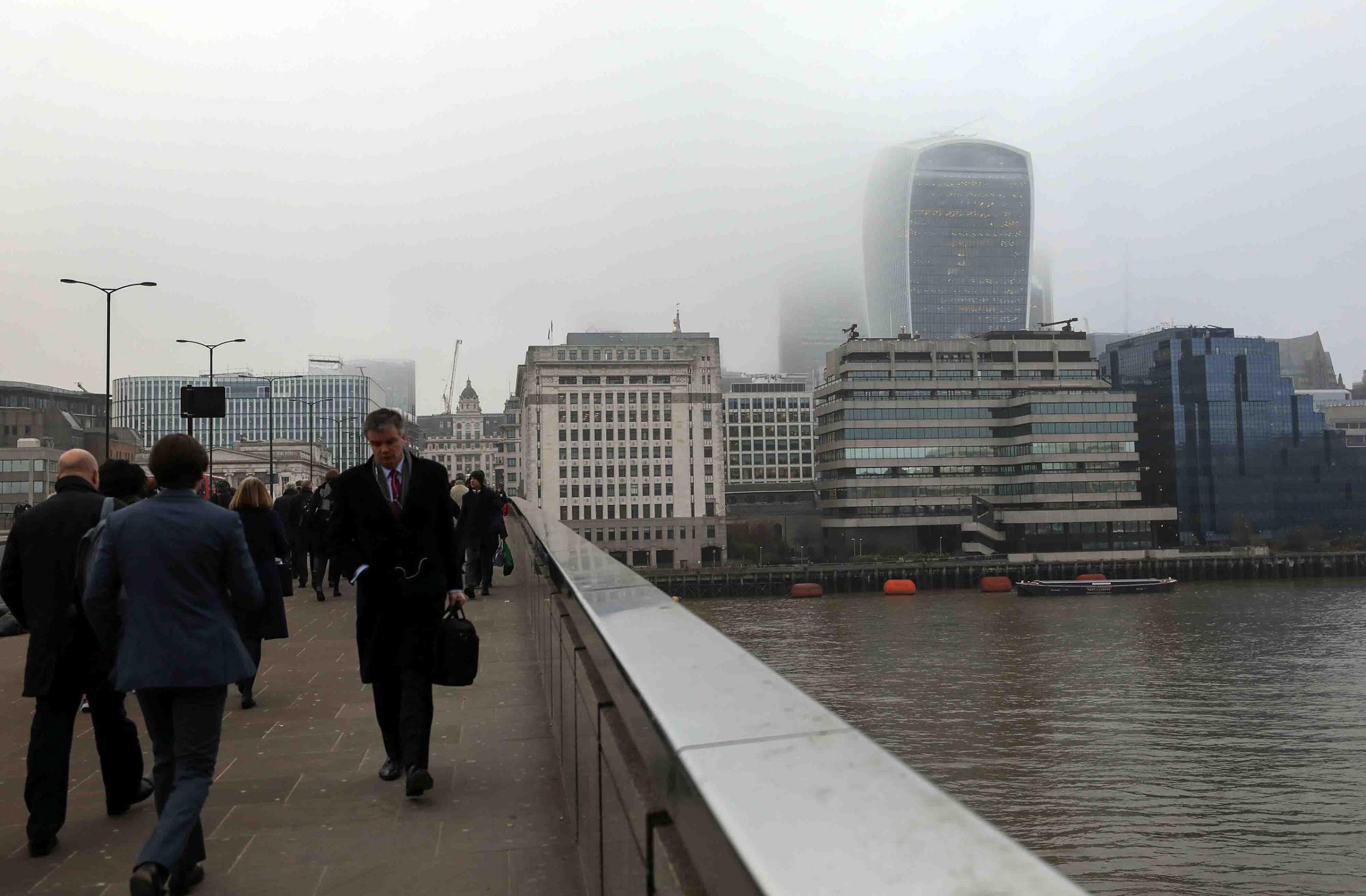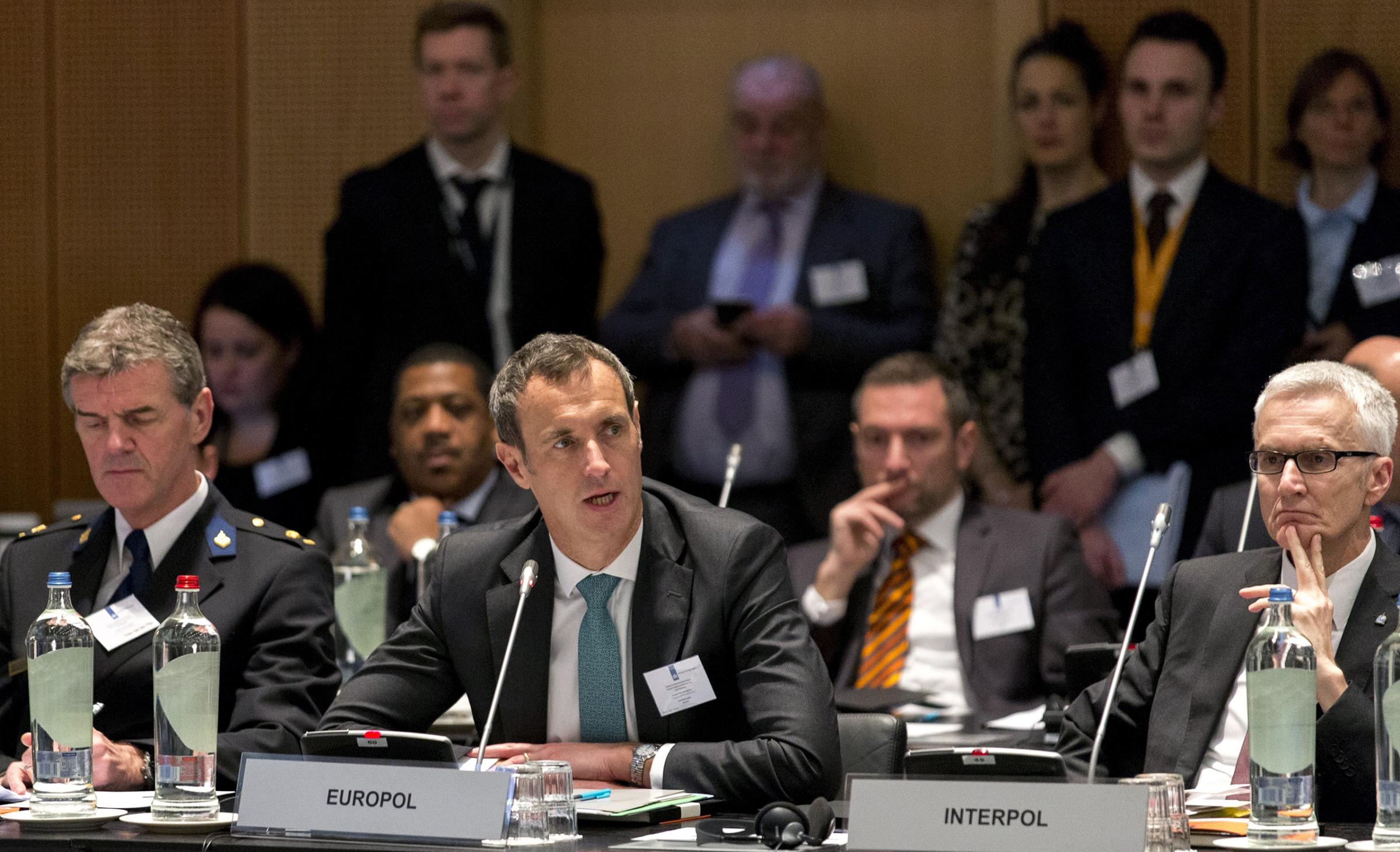The starter’s pistol has fired. British Prime Minister Theresa May has officially triggered “Article 50” of the Lisbon Treaty, initiating a two-year process of negotiations to bring the United Kingdom out of the European Union.
When 52% of the British electorate voted to leave the E.U. in June 2016, few realized just what a fiendishly complicated process it would be. After four decades of European integration, the bloc has buried its tendrils deep within every facet of British life — from its economy to its legal system. The process of Brexit begins in the shadow of great uncertainties for the United Kingdom, its citizens and its residents.
In truth, there are hundreds of unanswered questions about what Brexit will mean to Britain and to Europe. Here are just a few of them:
Leaving the E.U.

What will it cost the U.K. to leave the E.U.?
€60 billion, if the E.U’s senior diplomats get their way. The sum would cover the U.K.’s long-term commitments, such as contributions for pensions and regional development projects that won’t be completed until long after Brexit. The U.K. will try to whittle that down by negotiation, and may look to offset at least part of it against its sizable claims on E.U. institutions, such as its 16% stake in the European Investment Bank, worth nearly €40 billion (see below).
Does Britain have enough negotiators?
Britain hasn’t been in charge of its own trade policy for 44 years and there is a global shortage of trade negotiators. An initial review suggested the U.K. Has only about 20 experts in this field — against 600 highly experienced negotiators in the E.U. The U.K.’s business department has advertised for 300 negotiators and trade specialists. The fear is that strict pay structures will mean obvious candidates in lucrative roles with top law firms will snub working for the public sector.
Where will Brexit negotiations take place?
Almost certainly in Brussels, in the new Europa building. The psychedelic, egg-shaped, eco-friendly home for the European Council and Council of the European Union was designed by Belgian architect Philippe Samyn and brought into use at the beginning of the year. Officials are said to be uncertain about what to do with the U.K. delegation rooms once Brexit happens.
How long will they take?
A very long time. Article 50 begins the formal, two-year process of negotiation only on the terms of withdrawal from the European Union. It can only be extended by agreement with all 27 remaining European Union states. The U.K. hopes to have a framework for the post-Brexit relationship with the EU in place by the end of that process, in April 2019, but many believe that will not be settled for many years. Senior European figures say these talks — on trade, laws, markets, security and more — could take up to a decade, according to former EU ambassador to the U.K. Ivan Rogers. It’s highly likely we’ll still be talking about Brexit in the mid-20s.
Could Queen Elizabeth halt the process?
Theoretically yes, but in reality it would never happen. All bills, including Article 50, need royal assent — in other words, the Queen has to formally agree to make the bill into an Act of Parliament (law). The Queen is also due to introduce a ‘Great Repeal Bill’ in her next Queen’s Speech, which will repeal the European Communities Act 1972, ending the jurisdiction of the European Court of Justice in the U.K. and enshrining all existing E.U. law into British law. If the Queen were to refuse to give her assent to either, it would spark a constitutional crisis. The last time a monarch did so was in 1707, so anti-Brexiteers needn’t get their hopes up.
Is there any way individual Brits could opt to stay in the E.U.?
The idea of ‘associate E.U. membership’ has been raised, but it’s not likely to go anywhere. Charles Goerens, the European Parliament lawmaker from Luxembourg who came up with the idea, argues this remains a “realistic” aim. This would see Brits who want to work in the bloc granted this status and given a vote in European Parliament elections, while keeping their U.K. passport. British remain campaigners love the idea, but it is likely to be vetoed by May because it will create a two-tier system. Others in the E.U. are far from convinced that it would work.
Could Brexit lead to greater xenophobia towards E.U. migrants?
Reported incidents of religiously or racially motivated crimes in England and Wales was up 41% in July – just after the referendum – on the same no the previous year, according to Home Office figures. Nick Clegg, the pro-E.U. former deputy prime minister, tells TIME: “A Spanish woman in my constituency who has lived in England for many, many years who was talking Spanish to her young son had someone, for the first time, tell her ‘you should be going home’. There’s a sort of everyday nastiness, much of which is not recorded but has clearly increased very sharply – some very nasty people feel that their dark tendencies have been legitimized.” The fear is the start of The Article 50 process could see these prejudices unleashed again.
The Union

What happens to Scotland?
Scotland voted overwhelmingly – 62% to 38% – to remain in the E.U. and its government is seeking a way to opt out of Brexit. First Minister Nicola Sturgeon has paved the way for a second independence referendum not even three years after Scots narrowly rejected secession from the U.K. She argues Brexit means there is a “material change” that justifies another vote. May has refused to yield to Sturgeon’s demands for a special deal that would give Scotland continued membership of the E.U.’s Single Market. The Scottish Parliament voted on March 28 to hold a second referendum between Autumn 2018 and Spring 2019, by which time the economic risks of Brexit will be coming into ever sharper focus.
What happens to the Republic of Ireland and Northern Ireland?
After two decades of peace, the fear is that Brexit will create a hard border between a Northern Ireland that is part of the U.K. and a Republic that will remain within the E.U. Britain’s exit from the E.U.’s Customs Union has raised the prospect of physical checks on, for example, trucks carrying goods between Northern Ireland and the Republic. However, lawmakers are hopeful that Ireland will be made a special case and European Commission president Jean-Claude Juncker has argued the E.U. does not want any hard border to be put in place.
What happens to Gibraltar?
Spain has sought to use Brexit as an excuse to turbocharge its long-term desire to take back ‘The Rock’, a peninsular within its borders that has belong to the U.K. since the 18th century. The territory was the most pro-remaining slither voting district, with 96% voting to stay. Spain has suggested a joint sovereignty deal to protect Gibraltar’s ties with the E.U., but foreign minister Alfonso Dastis has acknowledged this is unlikely due to Britain’s refusal to negotiate.
What happens to the Channel Islands?
The most southerly part of the British Isles are self-governing Crown Dependencies and not part of the E.U. However, their key financial services industries do risk losing a degree of access to E.U. markets, making it harder for them to compete with the likes of Ireland and Luxembourg, which have likewise specialized in providing ‘offshore’ services to international companies and investors. Jersey’s financiers have been advising the British government on how the City of London could continue to serve their European customers.
Could cities in Britain opt out of Brexit?
Unlikely, given that it would violate the territorial integrity of the U.K., as well as being impossible to enforce in practice. What to do with an E.U. worker who is allowed to live and work in London, if his or her business suddenly relocated to, for example, Manchester or Edinburgh? Elected mayors, a relatively new feature of political life in the U.K., are trying to develop their own plans, notably in London. Ultimately though, rights of migration and residence are highly likely to be decided at national level.
Coming and Going

What happens to citizens of the U.K. currently living in the E.U. and vice versa?
The House of Lords has defied the Government, voting for an amendment to the Brexit bill that will protect the rights of E.U. nationals living in the U.K. This is further than May wants to go and the government is likely to overturn this amendment when the bill is voted on next. The Prime Minister is looking to nail down a reciprocal deal for the rights of Brits in Europe before making any full commitment to E.U. citizens, but some lawmakers fear this means both groups will end up as “bargaining chips.”
What happens to British pensioners living in the E.U.?
Around 1.2 million Brits are estimated to live in other E.U. member states. Like expats anywhere in the world, they are still entitled to the state pension. What is unclear is whether they will still qualify for increases in payments under what is know as the ‘triple lock’: pensions can go up in line each year with whatever is higher of average earnings, inflation, or 2.5%. However, the U.K. will have to broker a social security deal with the E.U. to make sure triple lock increases are still allowed, otherwise new ex-pat retirees will see their pensions frozen at their initial rate.
Can E.U. citizens allowed to stay after Article 50 expect access to the N.H.S.?
All E.U. citizens in the U.K. have access to the N.H.S. at present, despite a little-known rule that residents who are students or not employed but with plenty of money should have already taken out comprehensive health insurance. The Brexit campaign was partly based on the strain that immigration puts on the N.H.S., so unlimited access – particularly for the recently-arrived – is clearly at risk under the future arrangements. There are fears that even those who have lived in the U.K. for longer than five years might have to fill in an 85-page application form for permanent residency that will give them this access. Reciprocal access of U.K. citizens to E.U. health care systems could also become more complicated.
Will British citizens have to get visas to travel to Europe?
Unlikely, given how much money is at stake in both directions. E.U. citizens spent nearly 7.3 billion pounds visiting the U.K. in 2015, and countries such as Spain and Greece will resist anything that hit their tourism businesses. Still, May’s insistence on a hard Brexit theoretically risks the need for visas to even neighboring France. The E.U. has in recent years worked towards abolishing visas rather than introducing them, not least to support its tourism industry.
What will happen to the Channel Tunnel?
Trains will keep running from London to Paris and Brussels, but the Eurostar company is expecting Brexit to hit its bottom line. In evidence to Parliament executives said there were “no” benefits for the company to Brexit. Indeed, Eurostar’s business case might be undermined through any unforeseen additional costs Brexit could impose. The company has also blamed the economic consequences of the Brexit on a recent reduction of services, but, long-term, the impact is expected to be minimal.
The Economy

What happens to banks in London?
France is trying to woo City of London bankers to Paris. HSBC chief executive Stuart Gulliver said in January that around 1,000 of its staff would move from the British to French capital, while UBS said about a fifth of its 5,000 British staff could go, most likely to Germany’s financial centre, Frankfurt. Dublin and Luxembourg are among other centers hoping to take a slice of the U.K.’s huge banking industry, but Britain retains advantages of history and geography and hopes to keep the sector largely intact.
What will happen to the U.K. car industry, almost all of which is foreign-owned?
Car manufacturers have warned May that the introduction of tariffs would result in job and sale losses for an industry that is booming, with output at its highest level of production since 1999. Four-fifths of all cars made in the U.K. are exported and over half of those go to the E.U., so Mike Hawes, the chief executive of the Society of Motor Manufacturers and Traders, warned a deal that is as close to the Single Market as possible is vital. Nissan has announced an expansion of is plant in Sunderland in the North-east of England, but GM’s plants in the U.K. look vulnerable after the sale of its European operations to French-based PSA Group.
What will happen to Britain’s farmers?
Farmers are worried their industry will be hit by a 60% loss of income in the form of E.U. subsidies, a situation that Informa Agribusiness Intelligence has warned could see 90% of farms collapse. U.K. ministers have vowed to maintain subsidies to 2020, a year after Brexit negotiations are completed, but thereafter the focus will be on how trade deals will change the sector. There are fears the U.S. will flood the market with cheap beef treated with hormones that were, in effect, banned by the E.U., while a deal with New Zealand could see sheep farm businesses wrecked by cheap imports.
What will happen to Britain’s fishing industry?
The House of Lords reported in December that the U.K.’s fishing industry would need continued access to E.U. markets in order to remain viable. The U.K.’s fishing industry strongly disagrees, and is keen on defending exclusive access to U.K. waters. A deal granting access would be controversial, because re-establishing U.K. control of these waters, ceded in the 1970s, was a major aim among more hardened Brexiteers.
Will Brexit impact British astronauts?
Probably not. Britain is currently a member of the European Space Agency, so there are fears its departure from the E.U. would deny astronauts like former International Space Station resident Tim Peake from making the journey into orbit. But the space flight program is distinct from the E.U., to the extent that Canada is an associate member. British business minister Jesse Norman has confirmed that the U.K.’s future involvement in the ESA will be “handled separately from E.U. discussions.” The E.U. states should be happy with this, given the U.K. is one of the agency’s biggest budget contributors.
What will happen to European football players playing in the U.K.?
Players from E.U. countries will enjoy the same rights to reside and work in the U.K. as any E.U. citizen. Clubs currently have to apply for work permits for players from outside the European Economic Area (REF), and the baseline assumption is that this regime will apply to all non-U.K. players after Brexit. Broadly speaking, permits are easier to get for players who already represent their countries. Applying that principle to E.U. players won’t affect top-level recruitment much, but could limit the signing of young players for club academies.
Will Scotch Whisky cost more?
Depends where you live. Neither the E.U. nor the U.S., the two biggest export markets for Scottish distillers, impose import tariffs under WTO rules, so there is no direct risk there. Prices may rise in countries with which the E.U. has a free-trade agreement (FTA). The 2008 E.U.-Korea FTA, for example, phased out import tariffs on spirits completely (cheese-makers weren’t so lucky, being limited to quotas of tariff-free imports). Just as important as tariffs are FTA provisions that stop other countries from letting cheap local substitutes be labelled as “Scotch.” The U.K. will have to renegotiate tariffs, quotas and brand protection mechanisms in any new deals.
Will the U.K. have to regulate its own nuclear industry?
Yes — but not because of Brexit. Euratom is a 60-year-old agency designed to develop the E.U.’s nuclear energy market. It is legally distinct from the E.U., so there was shock when the U.K. Government sneaked out news recently that it would leave Euratom, which is thought to help provide a fifth of the country’s electricity. Critics say the referendum did not give a mandate for this change, while British regulators, already short of nuclear experts, will have to take over Euratom’s regulatory role and replace treaties it has with the likes of the U.S.
Will E.U. workers in skill shortage industries, such as fruit picking and construction, be allowed to stay in the U.K.?
Even many Brexiteers believe a system of permits will have to be developed for industries that have relied on, in particular, cheap Eastern European workers since the E.U. was expanded in the early 2000s. The fruit-picking industry is heavily lobbying lawmakers, because 95% of its seasonal workforce are from the E.U. However, there is the prospect they will not want to stay if the pound remains weak against the euro. It could prove more financially rewarding for them to exercise their free movement rights in other wealthy E.U. countries.
Is it too risky to take a job in U.K. if you’re a Brit right now?
If the job is fairly short-term, no. Article 50 negotiations will last two years, while May’s push for a transitional period between the divorce settlement and absolute Brexit should offer a few years of additional clarity and certainty on job rights.
The Finances

Will the U.K. still qualify for European Investment Bank (EIB) loans?
Not under the current rules, but the Luxembourg-based EIB has said it’s willing to change them to keep the ship steady. The EIB is a state-backed development bank that lends chiefly to infrastructure projects and indirectly backs programs for lending to small and medium-sized businesses. The U.K., which has some big infrastructure projects in the offing, is rare among E.U. states for not having a state-backed development bank of its own, and may have to tweak its own rules for similar lending by commercial banks to support credit availability.
Will central banks continue to hold sterling as a reserve currency?
The pound’s role as a reserve currency is already minimal, and Deutsche Bank said in January that it will become “increasingly irrelevant” as a global reserve currency (similar forecasts were made prior to the launch of the euro). Central banks no longer need pounds to cover their countries’ trade with the U.K., although Britain’s status as a stable, law-based democracy will mean that sterling remains an attractive store of value, at least if it can avoid further depreciation in the foreign exchange market. But a loss of capital inflows would make it much harder to cover the U.K.’s current account deficit, running at nearly 100 billion pounds a year.
Could Britain slash taxes on goods and services?
The E.U. runs a common V.A.T. system, so the U.K. will be free to introduce new rates for certain goods and services. This could give Britain a huge competitive advantage over its continental neighbors, given attempts to make practical improvements to V.A.T. for insurers and banks have been caught up in Brussels bureaucracy. In theory, Britain could scrap the levy on many products altogether, but it is the second biggest source of tax revenue so this highly unlikely.
What about corporation tax?
The government cut the standard rate of corporate income tax to 19% from 20% in this year’s budget, and pre-announced a further cut to 17% in 2020, the lowest among the G20 group of major industrial and emerging economies. The move aims at incentivising business to stay in the U.K. post-Brexit. Theresa May has hinted that the U.K. could cut it even further if the E.U. chose to punish it for Brexit by refusing favorable trade terms, although some have warned that openly engaging in tax competition could be counterproductive, hardening attitudes against Britain in other member states.
What happens to British university funding?
May seems to be pushing for U.K. to remain part of the E.U.’s Horizon program, which funds university research projects, through a bespoke arrangement. However, vice-chancellors of British institutions have already reported that they are being kicked off as lead universities on cross-border studies and that leading academics are looking to leave or prospective European lecturers think the U.K. is too risky a place to work. Former Liberal Democrat leader Nick Clegg says British academics and universities will struggle while they “haven’t got the faintest idea what the status” of the U.K. will ultimately be.
Rules and Regulations

Is the U.K. planning to loosen environmental regulations to stay competitive?
This is uncertain. The U.K.’s environmental and climate change standards and policies are embedded in E.U. law, but after Brexit, Britain will no longer take part in agreeing these fixed regulations and would be able to loosen its own. The E.U.’s emissions trading scheme and the U.K.’s own Climate Change Levy are both unpopular with various business sectors, but the more the U.K. loosens such regulations, the more it will expose itself to E.U. countermeasures to stop would be cast as environmental “dumping.”
What about labor laws?
Theresa May has promised to maintain E.U. labor laws — such as the expansion of discrimination categories in employment law such as age, sexual orientation and religion— through the “Great Repeal Bill,” which turns all existing E.U. rules into domestic law. The Trade Unions Congress, the body representing the majority of Britain’s trade unions, has nonetheless warned that workers rights could be eroded if Britain’s follows through on its threat to turn into a low tax and low regulation haven if it does not get a fair deal from the E.U. But it is unclear how the government will go down this route in reality and according to the OECD’s employment index, Britain is the least regulated labor market in the E.U., meaning there is already very little in terms to labor laws to be loosened.
Is the U.K. likely to loosen food safety standards?
There is a worry among politicians and campaigners that food safety standards will be weakened in the attempt to forge quick trade deals with foreign countries, like the U.S., criticized for their lax regulatory environments. The National Farmers Union is keen for those standards to not be watered down if they leave the E.U. But if other countries with low food safety standards begin to import cheaper produce to the U.K., the NFU is mindful that regulations in the U.K. will have to be changed in order to keep its producers competitive
How will the E.U. and U.K. resolve trade disputes in future?
Today, when British and European companies and governments argue over things like patents, food labelling or the clearing of trades in financial derivatives, the E.U. Court of Justice in Luxembourg is the court of last resort. That will have to change when the U.K. leaves the E.U.’s single market. New trading arrangements need a new legal framework for dispute resolution. The depth and breadth of cross-border trade between the E.U. and U.K. demands a solution that is faster and more specific than the World Trade Organization, but the issue so central to sovereignty concerns at the heart of Brexit, and so fiendishly complex, that a diplomatic and legal miracle will be needed to engineer an arrangement as straightforward as the existing one.
Law and Order

Will Britain continue to share national security data with the E.U.?
The security threats to the U.K. — from Islamist terror, Russian infiltration or organized crime — are to a large degree the same as those facing the E.U., so it’s no surprise that Theresa May has already pledged that cooperation on security will be a key part of the future relationship. The U.K. ‘opted in’ to a new intelligence-sharing program in November, five months after the referendum. Intelligence-gathering — including a unique degree of collaboration with the U.S. – is one of the biggest assets that the U.K. brings to the negotiations, and May will hope to get cooperation in matters going well beyond national security in return for sharing its secrets.
Will E.U. criminals face extradition from the U.K?
A speculative ‘yes’ says Steve Peers, an expert on E.U. law from the University of Essex. The U.K could follow countries, like Norway and Iceland, which are not a part of the E.U., but have created extradition treaties that are “more or less” the same as the European Arrest Warrant (EAW)— which is an E.U.-wide system that makes it easier to extradite people wanted for serious crimes. Leaving the E.U. might also make it easier to deport European criminal defendants who recently moved to the U.K. and committed crimes on British soil. But authorities may face roadblocks deporting criminals who are long-term residents of the U.K., as it could contravene local human rights laws.
Will Britain stay in Europol, the E.U.’s law enforcement body?
Probably. It has already opted to stay in Europol since leaving. The U.K.’s police minister Brandon Lewis said “the reality of cross-border crime remains” even if the U.K. is leaving the E.U. It seems May would like to find an accommodation to stay close to Europol. For example, the U.S. is an associate member and does not have to adhere to European Court of Justice rules.
Will Britain have to tighten its customs borders?
Undoubtedly, and it might make life difficult for importers. British ports alone will have to hire thousands of extra staff to check products from the E.U. that could previously pass through easily, haulage firms have warned. This red tape is likely to delay E.U. goods entering Britain by a day, a huge problem for a manufacturing industry that relies on the ‘just-in-time’ production model of getting parts in and out of factories quickly.
More Must-Reads from TIME
- Why Biden Dropped Out
- Ukraine’s Plan to Survive Trump
- The Rise of a New Kind of Parenting Guru
- The Chaos and Commotion of the RNC in Photos
- Why We All Have a Stake in Twisters’ Success
- 8 Eating Habits That Actually Improve Your Sleep
- Welcome to the Noah Lyles Olympics
- Get Our Paris Olympics Newsletter in Your Inbox
Write to Mark Leftly at mleftly@yahoo.co.uk and Kate Samuelson at kate.samuelson@time.com